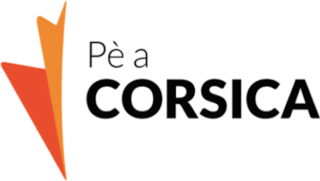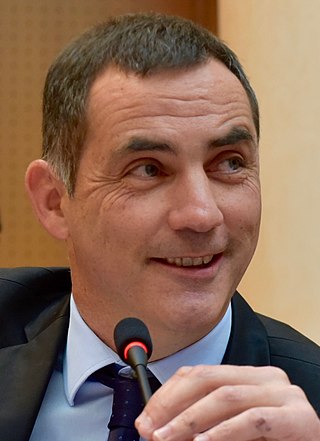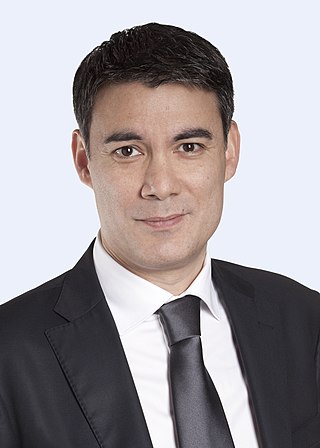
Corse-du-Sud is an administrative department of France, consisting of the southern part of the island of Corsica. The corresponding departmental territorial collectivity merged with that of Haute-Corse on 1 January 2018, forming the single territorial collectivity of Corsica, with territorial elections coinciding with the dissolution of the separate council. Although its administrative powers were ceded to the new territorial collectivity, it continues to remain an administrative department in its own right. In 2019, it had a population of 158,507.

The Corsican Assembly or Assembly of Corsica is the unicameral legislative body of the territorial collectivity of Corsica. It has its seat at the Grand Hôtel d'Ajaccio et Continental, in the Corsican capital of Ajaccio. After the 2017 territorial elections, the assembly was expanded from 51 to 63 seats, with the executive council expanding from 9 to 11 members.

Corsica Nazione was an electoral group in the Corsican Assembly composed of Corsican nationalist parties. It was led by Jean-Guy Talamoni, who would later become president of the Corsican Assembly in 2015 under the Corsica Libera political party. The group supported the nationalist paramilitaries of the Corsican conflict, and many of the parties in the coalition were political wings of various armed factions.

Corsica is an island in the Mediterranean Sea and one of the 18 regions of France. It is the fourth-largest island in the Mediterranean and lies southeast of the French mainland, west of the Italian Peninsula and immediately north of the Italian island of Sardinia, the nearest land mass. A single chain of mountains makes up two-thirds of the island. As of January 2024, it had a population of 355,528.

The Party of the Corsican Nation is a Corsican nationalist and autonomist political party on the French island of Corsica. It was founded in Corte in 2002 by members of three nationalist parties, Union of the Corsican People (UPC), A Scelta Nova and A Mossa Naziunale.

Corsican nationalism is the concept of a cohesive nation of Corsica and a national identity of its people. The Corsican autonomy movement stems from Corsican nationalism and advocates for further autonomy for the island, if not outright independence from France.

Corsica Libera is a left-wing separatist political party active in Corsica. It was founded in Corte in February 2009 by members of three nationalist parties, Corsica Nazione, Rinnovu and the Corsican Nationalist Alliance.

The 2015 Corsican protests were a series of marches by several hundred Corsican nationalists that began on 25 December, in Ajaccio, capital of Corsica. During the initial demonstrations, a Muslim prayer hall was burned down and Qur'ans were set alight. Further protests were organised after the initial march despite a government ban on protests until 4 January 2016. The protesters claimed to be acting in revenge for an incident that occurred the day prior when firefighters and police were assaulted in the neighbourhood of Les Jardins de l'Empereur; however, outside observers labeled the ensuing riots as anti-Arab and anti-Muslim. The Corsican nationalist politicians have claimed their view does not legitimise xenophobia, blaming the protest on French nationalism instead. Scholarly opinions on this claim are divided.

Pè a Corsica was a Corsican nationalist political alliance in France, which was calling for more autonomy for Corsica. More specifically, it was a coalition of the two Corsican nationalist parties active on the island; that is, the moderately autonomist Femu a Corsica and the strongly committed separatist Corsica Libera. The party was led by the autonomist Gilles Simeoni. The alliance was renewed for the 2017 territorial election. However, the alliance was dissolved for the 2021 territorial election.

La France Insoumise is a left-wing political party in France. It was launched in 2016 by Jean-Luc Mélenchon, then a Member of the European Parliament (MEP) and former co-president of the Left Party (PG). It aims to implement the eco-socialist and democratic socialist programme L'Avenir en commun. The party utilises the lower case Greek letter phi as its logotype.

Jean-Guy Talamoni is a Corsican politician and Corsican nationalist, who was President of the Corsican Assembly from 17 December 2015 to 1 July 2021. He previously served as leader of the Corsica Nazione electoral group in the Corsican assembly.

Femu a Corsica is a Corsican autonomist political party. It was formed for the first time prior to the 2010 French regional elections in the form of a political coalition. The coalition members, Inseme per a Corsica, the Party of the Corsican Nation (PNC) and Chjama Naziunale, merged during the founding congress of the party in Corte on 15 October 2017. The PUDEMU movement also merged into the new party. The PNC was later re-established in 2019. The leader of the party is Gilles Simeoni.

Gilles Simeoni is a lawyer and politician in Corsica, France. He was mayor of Bastia from 2014 to 2016 and has been president of the executive council of Corsica since 2015. Notably, Simeoni served as the Corsican nationalist Yvan Colonna's lawyer at his trial for the assassination of Claude Érignac.

Edmond Simeoni was a Corsican doctor, politician and nationalist. He was the brother of Max Simeoni, Member of the European Parliament (MEP) from 1989 to 1994 and father of Gilles Simeoni.

Laurent Marcangeli is a French politician who has served as Minister of Public Action, Civil Service and Simplification under Prime Minister François Bayrou since 23 December 2024. He previously served in the National Assembly from 2012 to 2017 and again from 2022 to 2024, representing the 1st constituency of Corse-du-Sud.

Regional elections were held in France on 20 June and 27 June 2021. At stake were the regional councils in metropolitan and overseas France including the Corsican Assembly, Assembly of French Guiana and Assembly of Martinique, all for a six-year term. The Departmental Council of Mayotte, which also exercises the powers of a region, also participated in this election, because the departmental elections were held at the same time. Eighteen regional presidencies were at stake, with thirteen in mainland France and Corsica, as well as five overseas. Though they do not have legislative autonomy, these territorial collectivities manage sizable budgets. Moreover, regional elections are often perceived as a mid-term opinion poll. Due to the COVID-19 pandemic, the regional and departmental elections were postponed, first to 13 and 20 June 2021 and then to 20 and 27 June 2021.

Dominique Bucchini, born on January 24, 1943, in Sartène (Corse-du-Sud), is a French politician. Member of the French Communist Party (PCF), he was the mayor of Sartène, MEP and president of the Corsican Assembly.
Marie-Antoinette Maupertuis, also called Nanette Maupertuis, is a French politician and academic practicing in Corsica.
In March 2022, the island of Corsica, France, saw protests in response to a prison attack on nationalist leader Yvan Colonna. There were rallies in the main cities of Ajaccio, Calvi and Bastia that descended into violent clashes between police and protestors. Protestors threw stones and flares at gendarmes.

Corsican autonomy is the idea and movement supporting the status of an autonomous region for the island of Corsica within the French Republic. Most supporters of greater autonomy are Corsican nationalists. The ruling Femu a Corsica party supports an autonomous status for Corsica.



















